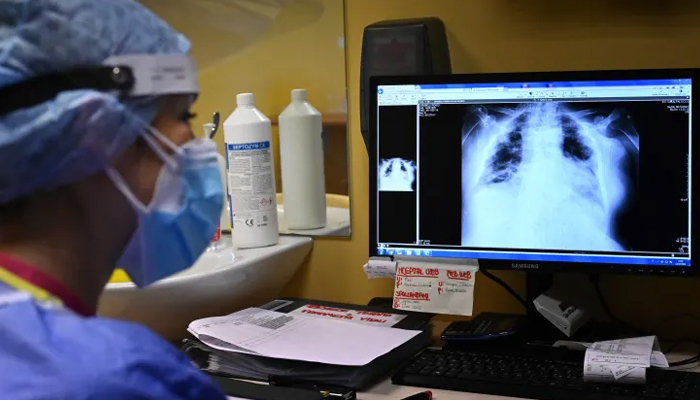‘Precautionary measures to safeguard children from pneumonia’
Experts say that apart from safeguarding children and infants from cold, they must be kept in a clean environment
Rawalpindi : A recent spell of rainfall has helped improve the quality of air through cleansing that may have a beneficial effect on public health particularly on the subject of controlling the incidences of respiratory tract infections and asthmatic complications but for children and infants, the case may be different because the fall in temperature below 10 degree centigrade may cause severe problems including pneumonia among them if proper preventive measures are not taken.
Health experts say that an extreme cold wave has hit this region of the country and it is time for parents to opt for measures needed to safeguard their children from upper and lower respiratory infections including pneumonia that has killed hundreds of children particularly below five years of age in the northern part of the country this winter.
Studies reveal that every 30 seconds, a child somewhere in the world, dies of pneumonia while in Pakistan, an estimated seven million cases of pneumonia occur every year and out of these, over 100,000 children die before their fifth birthday due to the infection.
Children whose immune systems are compromised are at higher risk of developing pneumonia while infants and children below two years of age are at the greatest risk as their immune systems are still developing. Experts say that parents must take extraordinary measures for the children below five years of age to safeguard them from the infection.
Pneumonia is preventable and treatable with a host of proven interventions, including exclusive breastfeeding infants in their first six months of life and ensuring an environment free of indoor air pollution. Frequent hand washing and immunizing against leading causes can help reduce the cases of pneumonia.
A child’s immune system may be weakened by malnutrition or undernourishment, especially in infants who are not exclusively breastfed for the first six months of their life. By appropriately treating underlying causes such as malnutrition and exclusively breast-feeding children for the first six months of their life can decrease the risk of pneumonia.
Environmental factors such as indoor air pollution caused by cooking fires and heating with various fuels including wood, dung, coal or even natural gas, living in crowded homes and parental smoking also increase a child’s susceptibility to pneumonia. It is alarming that Pakistan has the lowest breastfeeding rates in South Asia, 37 per cent.
Experts say that apart from safeguarding children and infants from cold, they must be kept in a clean environment. Wet clothes of children and infants should be removed immediately and adults with complaints of flu and cold should take extra care while handling children. Infants and children must be kept warm.
Studies reveal that limiting exposure of children to smoke from cigarettes or indoor cook-stoves and fires can help limit the risk of pneumonia. Hand washing with soap and water can reduce the number of pneumonia cases in children under the age of five by more than 50 per cent.
Immunisation against pneumococcus, measles, influenza and whooping cough is the most effective way to prevent pneumonia. Parents should take their children to the nearest public sector healthcare facility or hospital for the administration of vaccines that are available free of cost.
-
 Prince Harry Warns Meghan Markle To 'step Back'
Prince Harry Warns Meghan Markle To 'step Back' -
 Selena Gomez Explains Why She Thought Lupus Was 'life-or-death'
Selena Gomez Explains Why She Thought Lupus Was 'life-or-death' -
 New Zealand Flood Crisis: State Of Emergency Declared As North Island Braces For More Storms
New Zealand Flood Crisis: State Of Emergency Declared As North Island Braces For More Storms -
 Nancy Guthrie Case: Mystery Deepens As Unknown DNA Found At Property
Nancy Guthrie Case: Mystery Deepens As Unknown DNA Found At Property -
 James Van Der Beek's Brother Breaks Silence On Actor's Tragic Death
James Van Der Beek's Brother Breaks Silence On Actor's Tragic Death -
 Megan Thee Stallion On New Romance With Klay Thompson: 'I'm Comfy'
Megan Thee Stallion On New Romance With Klay Thompson: 'I'm Comfy' -
 Nicole Kidman Celebrates Galentine’s Day Months After Keith Urban Split
Nicole Kidman Celebrates Galentine’s Day Months After Keith Urban Split -
 Justin Bieber Unveils Hailey Bieber As First Face Of SKYLRK In Intimate Campaign Debut
Justin Bieber Unveils Hailey Bieber As First Face Of SKYLRK In Intimate Campaign Debut -
 Caitlin O’Connor Says Fiance Joe Manganiello Has Changed Valentine’s Day For Her
Caitlin O’Connor Says Fiance Joe Manganiello Has Changed Valentine’s Day For Her -
 Rachel Zoe Sends Out Message For Womne With Her Post-divorce Diamond Ring
Rachel Zoe Sends Out Message For Womne With Her Post-divorce Diamond Ring -
 James Van Der Beek's Final Conversation With Director Roger Avary Laid Bare: 'We Cried'
James Van Der Beek's Final Conversation With Director Roger Avary Laid Bare: 'We Cried' -
 Jaden Smith Walks Out Of Interview After Kanye West Question At Film Premiere
Jaden Smith Walks Out Of Interview After Kanye West Question At Film Premiere -
 Michelle Obama Gets Candid About Spontaneous Decision At Piercings Tattoo
Michelle Obama Gets Candid About Spontaneous Decision At Piercings Tattoo -
 Why Halle Berry Wasn't Ready For Marriage After Van Hunt Popped Question? Source
Why Halle Berry Wasn't Ready For Marriage After Van Hunt Popped Question? Source -
 Bunnie Xo Shares Raw Confession After Year-long IVF Struggle
Bunnie Xo Shares Raw Confession After Year-long IVF Struggle -
 Brooks Nader Reveals Why She Quit Fillers After Years
Brooks Nader Reveals Why She Quit Fillers After Years




